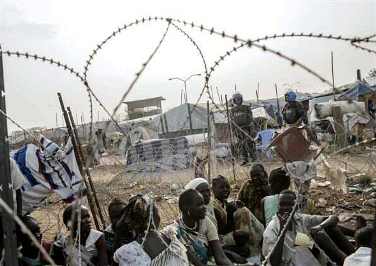US to consider more individual sanctions over S. Sudan crisis
July 3, 2014 (JUBA) – The US government may consider more individual sanctions if warranted against those found to be thwarting efforts to resolve the South Sudan crisis, visiting state department officials told reporters on Wednesday.

“At the moment economic sanctions [on South Sudan] are not on the table, but we are talking about individual sanctions, which we already have done,” said Feldstein at the conclusion of his trip to the capital, Juba.
He warned that those responsible for ongoing violations could be hit with US government sanctions.
“We are thinking about all options right now and we are trying to put more pressure … certainly for the peace to hold,” he said.
South Sudan has been mired in conflict and a worsening humanitarian situation since political tensions in the ruling SPLM erupted in violence in mid-December last year.
The fighting has pitted troops loyal to president Salva Kiir against rebels aligned with former vice-president Riek Machar, who was sacked last July.
Both sides have been accused of committing atrocities, including rape and forced detention and ethnic killings.
During his visit, Feldstein called on the government and opposition forces to show their commitment to holding their fighters accountable for atrocities documented by human rights groups.
“We do believe some sort of mechanism of accountability needs to be in place,” he said.
In May, the US slapped sanctions on two leading army commanders on opposing sides of the South Sudan conflict amid growing frustration in Washington with the country’s rival leaders and the slow pace of political negotiations.
Under the sanctions, Peter Gadet, an army commander loyal to Machar, and Maj-Gen Marial Chanuong, head of Kiir’s presidential guard, were banned from travelling to the US and any assets in the country frozen.
Feldstein said his government would not impose a solution to resolve the conflict, but stressed the need for all stakeholders to participate in the peace process.
IGAD called off talks last week after opposition delegates boycotted negotiations after claiming the selection process for other stakeholders wanting to participate in talks was unfair.
(ST)
